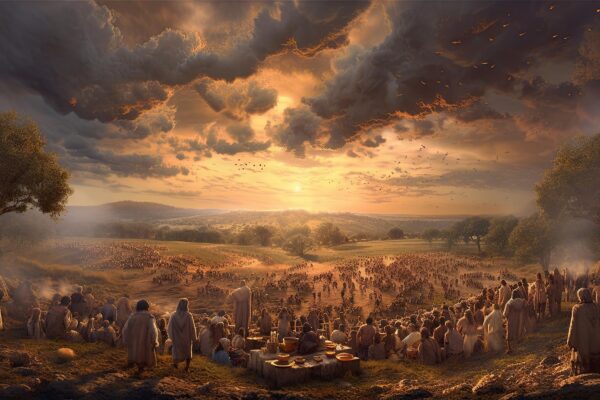Habakkuk is a little book written by a little-known prophet. His name might mean “to embrace,” but we aren’t even sure about that. Nor when the obscure book at the back of the Old Testament was written — perhaps during the evil reign of Manasseh, or closer to Babylon’s siege of Jerusalem, from the mid-to-late seventh century bc.
What we may be certain of is that Habakkuk wrote during a time of national moral decline and that his message would be among the most theologically important and influential in all the Bible. Thanks to the singular statement of God in the middle of his prophecy — “the just shall live by his faith” — and the dark context it is embedded in, this little book resonates to this day.
Questions and answers
Habakkuk is unique among the prophets of Israel. Unlike such watchmen as Jeremiah, Ezekiel, Hosea, and Isaiah, who spoke for God to warn the nation, Habakkuk spoke to God about the nation. He was troubled by what he saw and had no answers, only questions. Where was God in the moral crisis that Judah faced?
O Lord, how long shall I cry,
And You will not hear?
Even cry out to You, “Violence!”
And You will not save.
Why do You show me iniquity,
And cause me to see trouble?
For plundering and violence are before me;
There is strife, and contention arises.
Therefore the law is powerless,
And justice never goes forth.
For the wicked surround the righteous;
Therefore perverse judgment proceeds (1:2-4).
Questions: How long, God? Why, God? The burden of the prophet was a cry to the covenant God of Israel regarding the iniquity and trouble he witnessed in the land. The law was abandoned and injustice abounded. Violence defined the time. Only Psalms and Proverbs use violence (Hebrew: hamas) more than little Habakkuk. It was a contentious time when the wicked bullied the righteous. This moral calamity spelled doom for the nation. Where was God? Would He save?
Into the prophet’s concerns and questions, God replied: “Look among the nations and watch — be utterly astounded! For I will work a work in your days which you would not believe, though it were told you”
(v. 5).
God’s answer to Habakkuk first reasserted His inscrutable sovereignty over Israel and all nations. The wickedness of Judah would be judged. The Chaldeans were coming and with them, a terrible brutality that would scoff at and overrun all kings (vv. 6-11).
But this sobering news only raised more questions for Habakkuk. At the mercy of unimaginable, cataclysmic forces beyond his control, he recognized that God had appointed Babylon for correction. He asked, “Are You not from everlasting, O Lord my God, my Holy One? . . . Why do You look on those who deal treacherously, and hold Your tongue when the wicked devours a person more righteous than he?” Why did the holy and pure God of Israel let all this evil go unchecked? Would He let His people die? Would this treacherous, godless Babylon “continue to slay nations without pity?” (vv. 12, 13, 17).
Habakkuk put the question to God, then received God’s answer.
I will stand my watch
And set myself on the rampart,
And watch to see what He will say to me,
And what I will answer when I am corrected.
Then the Lord answered me and said:
“Write the vision
And make it plain on tablets,
That he may run who reads it.
For the vision is yet for an appointed time;
But at the end it will speak, and it will not lie.
Though it tarries, wait for it;
Because it will surely come,
It will not tarry.
“Behold the proud,
His soul is not upright in him;
But the just shall live by his faith (2:1-4).
Habakkuk’s questions were many, but God’s answer was simple. Trust Me! Whatever the circumstances, believe! This is the character of the righteous and the sign of true life in a world of decay and death. The message of Habakkuk is that YHWH, in His sovereign time and power, will bring full justice and end all violence.
“For the earth will be filled with the knowledge of the glory of the Lord, as the waters cover the sea . . . But the Lord is in His holy temple. Let all the earth keep silence before Him” (vv. 14, 20).
A hymn of faith
Centuries later, Habakkuk’s message of a living faith in the face of every question and calamity would become the cornerstone of New Testament teaching about the sovereign work of God in Jesus Christ. At the appointed time, “The just shall live by faith” was proclaimed from Israel to Rome under the shadow of another wicked empire. It was the cornerstone of the gospel that Jesus is Lord, despite all appearances (Romans 1:17; Galatians 3:11; Hebrews 10:38). The nations rage, but God saves through Jesus those who will believe.
Habakkuk ends his little book with a beautiful hymn of faith in the face of our personal questions and national calamities:
Though the fig tree may not blossom,
Nor fruit be on the vines;
Though the labor of the olive may fail,
And the fields yield no food;
Though the flock may be cut off from the fold,
And there be no herd in the stalls —
Yet I will rejoice in the Lord,
I will joy in the God of my salvation.
The Lord God is my strength;
He will make my feet like deer’s feet,
And He will make me walk on my high hills (3:17-19).
Let’s hear and embrace the message of the faithful watchman, Habakkuk. Proclaim “The just shall live by faith.” Amen!







